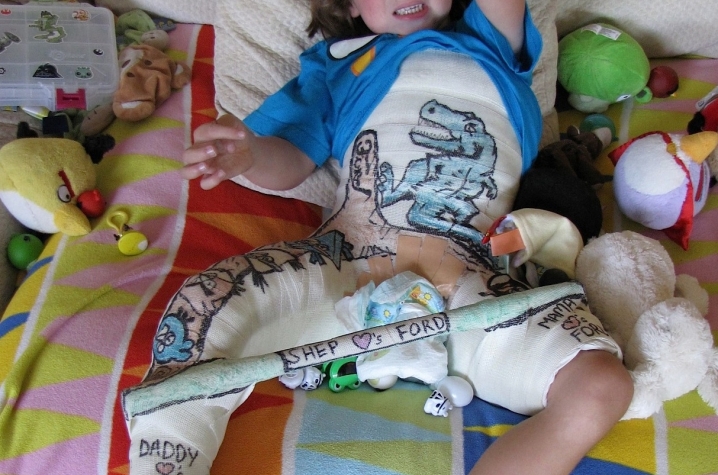Grant Provides Special Car Seats for Kids With Femur, Pelvic Injuries
LEXINGTON, Ky. (April 21, 2014) - To an outdoor-loving, tree-climbing 4-year-old boy, six weeks of summer immobilized in a spica cast is an eternity.
This was the case for Ford Francis of Worthington, Ky., who suffered a high break to his femur bone while camping with his grandfather last summer. A tumble across the entrance of a tent sent him to the local emergency room, and then to Kentucky Children's Hospital for urgent care. Ford’s fractured leg was set and held with a spica cast that went from his legs to his chest, limiting his mobility and making car transport almost impossible with a regular car seat.
As part of a program offered by Kentucky Children's Hospital, Ford's family received a car seat specially designed for young children with spica casts. These car seats, which can cost as much as $500 and aren't available in retail stores, are provided to families to make safe transport possible for children recovering from femur and pelvis injuries.
Ford's mom, Kristen Francis, said the car seat allowed her to take Ford out of the house during his six-week recovery period. Car trips to restaurants and to the toy shop were mood-boosters for Ford, who really wanted to play with his friends outdoors.
"It made his life seem a little bit more normal," Kristen Francis said of the car seat.
The Kentucky Children's Hospital obtained a grant from the Children's Miracle Network last year to purchase 10 special car seats per year for children who required spica casts. The program supplies a car seat to spica cast patients as young as infants to 6 years of age.
Before Kentucky Children's Hospital received the grant supporting the program, getting a child in a spica cast home was a dilemma for many families. Dr. Todd Milbrandt, program director for the Department of Orthopaedic Surgery, said patients had the option to purchase a special car seat out-of-pocket or request an ambulance ride home. The only other alternative was transporting children in a car without proper safety restraints, which was strongly discouraged.
Milbrandt expressed concern about the safety of the children during return trips for follow-up care. Providing the car seat service to patients ensures all children will have the proper four-point restraint while riding in a car in a spica cast.
"Of course, some of our families can't afford a brand new car seat," Milbrandt said. "We were worried kids who were hurt were being transferred home unsafely or by an ambulance, which is very expensive."
Milbrandt said a child's inhibited mobility during a spica cast recovery can be a source of stress for both parents and the injured child. The ability to get out of the house can help reduce some of that stress.
MEDIA CONTACT: Elizabeth Adams, elizabethadams@uky.edu






